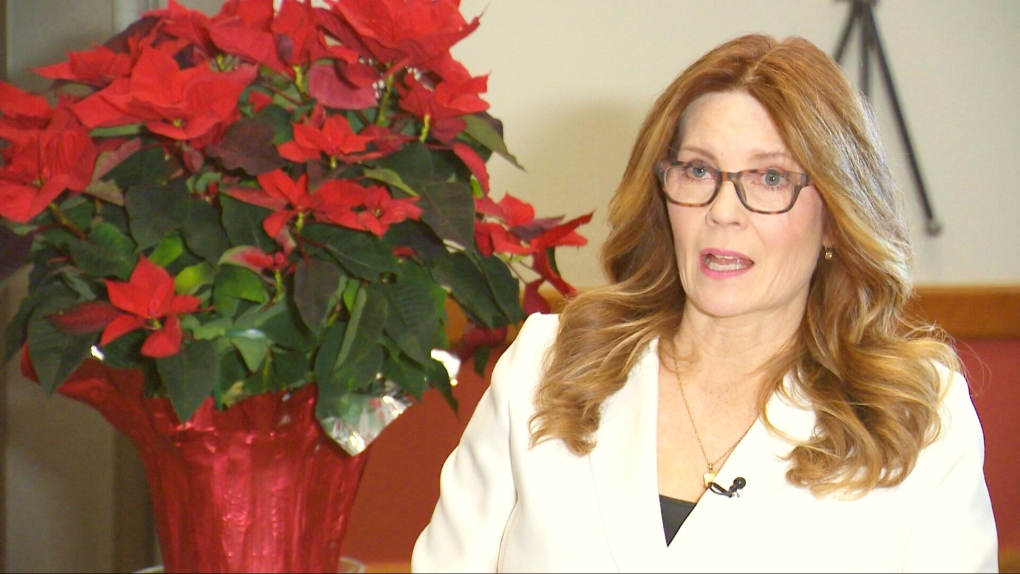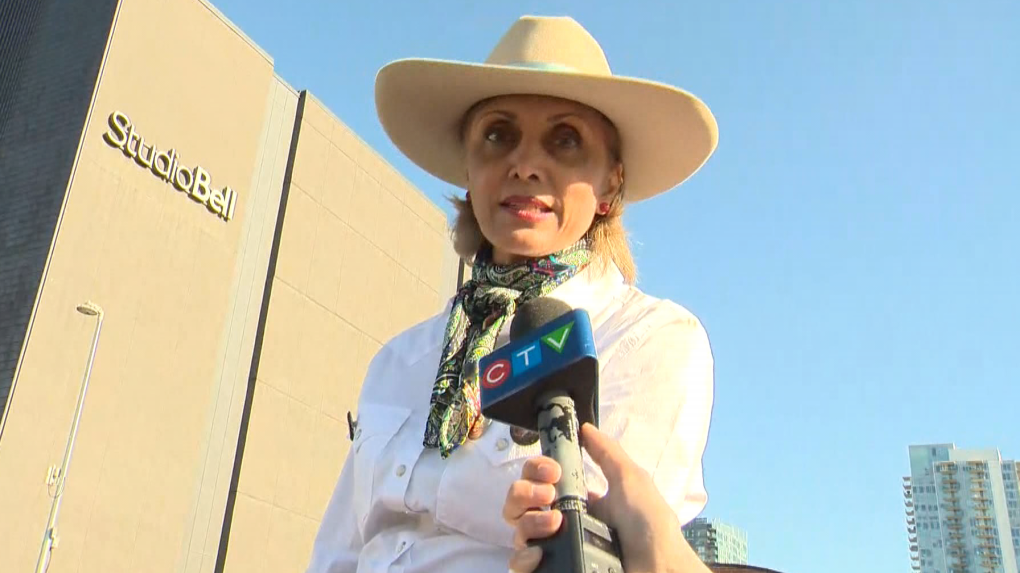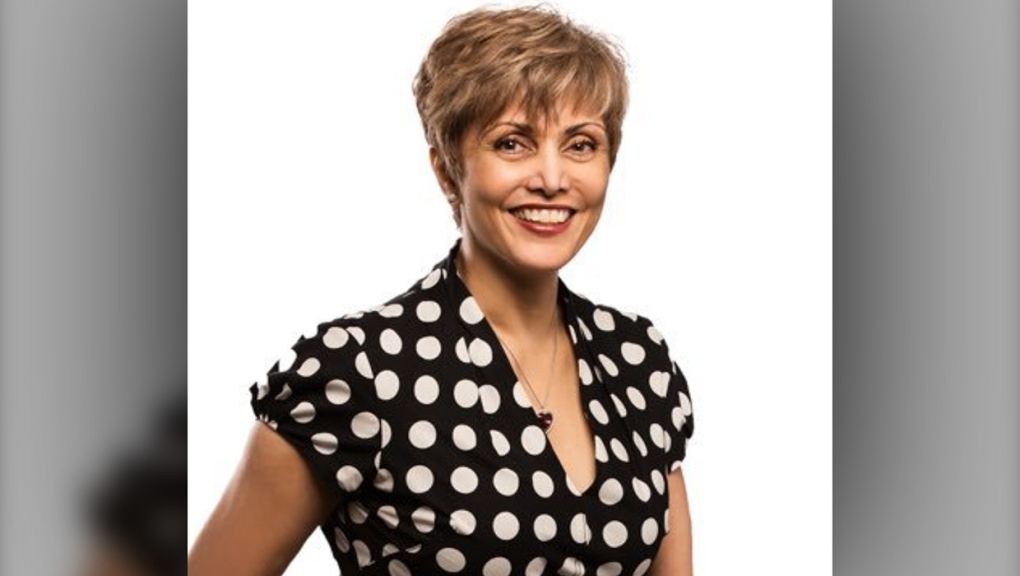'This is not our alignment': Year-end interview with Calgary Mayor Jyoti Gondek reveals fissures between city and province on Green Line
CTV News anchor Tara Nelson sat down with Calgary Mayor Jyoti Gondek to talk about the issues that concerned Calgarians in 2024, including the water main break, the Green Line, affordable housing and the city's relationship with the provincial government.
This interview has been edited for length.
Q: Why don’t we start with the one issue I think impacted all Calgarians this year and that was the water main break. Can you explain as simply as possible what the investigation into the cause (of the break) determined?
Gondek. What we know with the incident review that we’ve received is that there were chlorides in the soil, there were conditions that created corrosion of the steel wires and there was cracking of the mortar that coats the pipe.
Now what we also know from the consultants that we hired and our internal team is that there was no consistency of all of those conditions so it’s not like everywhere in the pipe that suffered a break had the same soil conditions or corrosion conditions – so it’s hard to correlate exactly how it happened.
There are indicators that show us that there were problems, but not one of those problems is the sole cause so there’s also an independent review that’s going to be done and it will dig even more in-depth – and that one will take a little bit longer, but it will also be more complete.
Q. Let’s talk a little bit about the chlorides. The indication seems to be that that’s from the salt that’s on the road in the winter – so if that’s the case, what now? What will we use instead?
Gondek: My question was, if we think that it’s because of materials that we used, to de-ice, are we going to stop using those materials now? Is it definitive that those materials created the soil conditions? And right now, nothing’s definitive.
So the research they’re doing right now is into (answering) how did the chloride level spike so high in the soils and why is it that some parts of the pipe were impacted and other parts were not?
So there’s still more work to do.
 CTV News anchor Tara Nelson spoke to Calgary mayor Jyoti Gondek in a year-end interview in December, 2024.
CTV News anchor Tara Nelson spoke to Calgary mayor Jyoti Gondek in a year-end interview in December, 2024.
Q. A lot of Calgarians expressed anger that there was such a catastrophic failure of this pipe. Should the city have known that there were problems down there?
G. These were very clear questions that we asked both the consultant and our internal team. Should we have known that something was going to happen?
And the response was, you couldn’t have known. Earlier in March, when they went in to do the acoustic technology and put in the air valves, there was nothing indicating that the pipe was going to break. So all indications that we have right now are that we couldn’t have predicted that break would happen.
Q. The province has now presented its proposal for the Green Line. In a nutshell, it’s closer to the original plan from 2021, so it will go all the way south to Shepard but it ends downtown at Seventh Avenue. It’s not going to go on to Eau Claire. The route downtown will either be at grade or elevated – no tunnelling. What do you think of this proposal?
Gondek. We need to ask some questions about who holds the risk on this project. I think people will remember back in July, we were told if you think that tunnelling is the right solution and it’s going to cost more, then it’s on you.
And as a city, we picked up that cost. We came up with the overage because that was our alignment.
This is not our alignment. This is an alignment that has been put together by a consultant that was engaged by the province for a very particular task and this is an alignment that is completely the idea of the province – so they should be bearing the risk on this and we don’t have the answer on that right now.
It’s a false narrative for the province to say everything is in city council’s hands right now. It’s not. We’re just at the point of getting into the questions that we have and engaging and having discussion and frankly negotiating how this is going to be done.
This is not a matter of 'yay or nay'. This is a matter of 'how will this even be possible?'

Q. The province very much seems to be saying, take it or leave it. Here’s the plan. If you want the money, you must accept it.
Gondek. Quite often, that’s the impression that we get.
I would remind the province that back in September, when they pulled their funding for this project, and were willing to let it die, we came back and said, this project is critical for the future of our city.
There are Calgarians that are relying on us to build a north to south transit spine.
We can’t be flip. You can’t just send us a letter saying your funding’s gone.
If you want a different alignment, talk to us about it. And that’s what we’ve spent three months doing: speaking with them in good faith, waiting, patiently, for their consultant’s report to come in.
Now that we have it, there’s a lot of questions. Just as they have had questions for us in the past as we’ve done alignments, we have questions for them.
Q. The relationship between the city and the province I would say seems a bit fractious, contentious at times. I wonder how you would describe it.
Gondek. I think there’s times when the provincial government has flexed its muscle and said to us, you are the child in this parent-child relationship. We hold power.
They have reinforced their power by passing several bills. We get it. We are brought into existence through the Municipal Government Act.
We’re not arguing that at all. So I don’t know what this big power flex is all about.
What’s funny is now that we’ve got a project that they’re proposing, with their alignment, through their consultant, they’re acting like the project is ours. So my thought back to them would be, if you want to wield power and you do have that in the relationship that we exist in together, then you must take responsibility for this project.
In other provinces, you would have a provincial transit authority that would take on financing of the project, and the risk related to the project. Municipalities simply can’t bear that. And we tried very hard to do that with the Green Line for a number of years over almost a decade.
We can’t do it now.
Q. Affordable housing is of course a major concern for the city as well. So can you talk about what some of the big areas are, in your main vision?
Gondek.. Some of the big moves we are making as a city is making sure that any city-owned land that we don’t need for any projects is available to non-profit service providers, to make sure that the private sector is able to partner with a housing provider to deliver housing on those parcels of land.
We have also made sure that we’re investing in folks who want to create a secondary suite that is safe in their homes. That is a very quick way to help people create a safe environment to live in. It’s one of the low-cost housing options that we need to make sure we have enough of in our city.
We are also doing per-door incentives for people who are building housing – and we continue to work on our downtown housing conversion program where we are taking vacant downtown office space and creating housing for people – and the beauty of the incentive program that we offer is that many of the folks who are doing conversions, are then able to create affordable housing in those projects as well through the incentive.
So there’s a lot of ways we are doing our best to deliver on housing.
 Jyoti Gondek has been declared the next mayor of Calgary. (supplied)
Jyoti Gondek has been declared the next mayor of Calgary. (supplied)
Q. Council passed a blanket rezoning bylaw with the majority of presenters opposed. It has gone to court and could be overturned. Opponents say council is ignoring homeowners and exceeding their property rights. How would you respond to that?
Gondek: When we did the hearings on rezoning, we had opportunity for anybody from the public who wished to present a perspective to be able to come before council and do so – and we had more than 700 people come and present. and I think it’s important to recognize that we were very open to hearing from everyone.
As a matter of fact, I had a meeting with community association leaders just before that hearing. And I took in everything they had to say – and I can tell you that a great deal of what concerns people is the built form.
What is it that’s going to be beside me or across the street from me? And how can I weigh in on what that’s going to do to me? And we really didn’t have that opportunity at the development permit stage – so some of the amendments we made as a result of that public hearing and as a result of meeting with community associations is (offering) better opportunity for feedback and engagement during the development permit process.
To be able to say, ‘I don’t think these windows are going to offer me privacy or this air conditioning unit is going to disrupt my life – so people have a greater opportunity to engage at that stage and if we hadn’t held the hearing and hadn’t had people come out, we wouldn’t have known that those changes are important.
Q. Public outcry also led to council repealing its earlier single-use plastics bylaw earlier this year. Restos in particular disliked it. But the city has said that 50 million single-use items end up in the landfill each year – so what is the solution to reducing landfill waste?
Gondek: When it came to the single-use bylaw, we made a decision in January 2023 that we would enact a new bylaw in January of 2024.
In that year, we didn’t do a great job of communicating this out to Calgarians and restaurant owners either. And we have to take responsibility when we don’t do a great job either.
We have a lot of items going to the landfill that could be diverted, and they’re not, because people are taking takeaway bags and throwing everything in them and tossing them out – so we felt if they had to pay for a bag, they might think twice.
(It) wasn’t the right way to go. We absolutely didn’t communicate this to Calgarians, it wasn’t the time to do this.
We continue to work with restaurant owners to make sure they’ve got the waste bins composting bins and recycling bins – and, if you’re having takeaway, just making sure youre thinking about where you’re throwing the things that you’ve taken.
Q. The blanket rezoning bylaw and single-use bylaw were two issues that were cited by some Calgarians in a municipal survey (done) by ThinkHQ. The mayoral approval ratings in that survey are unprecedentedly low: 64 per cent of those asked offered negative ratings of your performance – but you have announced that you are going to run for re-election.
How will you swing public opinion back in your favour?
Gondek. I can tell you that we had to stick to our principles to keep investing in our city. To keep investing in strong infrastructure, to invest in public transit, and frankly in public safety. It is so important to make sure that Calgarians have a good quality of life and they feel safe in their city. Those are decisions that we had to make and it impacted peoples’ property taxes and that’s never popular. But you can’t lead by populism.
Q. You’ve taken a lot of abuse in this position, mayor. There was even a recall campaign that failed, ultimately, but I think a lot of people might wonder: why do you want to do this again?
Gondek. This work is just incredible – and I wake up every morning feeling so privileged to be able to do this kind of public service.
This is a pretty important time in our city to make sure we get things right. And I want to be involved in that. I want to make sure I’m giving my best, that I’m looking at the data and evidence that are presented to us, and making strong decisions about the future of our city.
It matters to our future generations -- to our kids and to our grandkids -- that we are making the investments that will keep this city whole and thriving – and when we talk about being a place where people are moving, in droves, we’ve got 200 to 250 people moving to our city every day.
We continue to be at the top of livability lists. We have the top tech workforce in North America right now. We are doing things well and people feel like they’re welcomed and they belong here.
To keep that alive, we need to continue to make investments – and that’s something I’m very interested in doing.
With files from Tara Nelson
CTVNews.ca Top Stories

Putin apologizes to Azerbaijan's Aliyev over 'tragic incident' with plane in Russian airspace
Russia's Vladimir Putin on Saturday apologized to Azerbaijan's president for a 'tragic incident' which happened in Russian airspace involving an Azerbaijan Airlines passenger plane that crashed after air defenses were used against Ukrainian drones.
G2 driver stopped going more than 100 km/h over the speed limit on Hwy. 401 in eastern Ontario
A 17-year-old driver is facing charges after being caught speeding and driving dangerously on Highway 401 in eastern Ontario Friday evening, according to the Ontario Provincial Police (OPP).
How some men are trying to fight online misogyny amid 'your body, my choice' rhetoric
A young man with a buzz cut leans on a pristine countertop in a stark white kitchen and looks directly into the camera as he delivers what he presents as the secret to dating success for straight men.
The husband-wife legal team working on two of today’s biggest criminal cases
The rapper Sean 'Diddy' Combs and the suspected health care CEO assassin Luigi Mangione have decided on a similar defense strategy: Hire an Agnifilo. Or two.
Trudeau, Carney push back over Trump's ongoing 51st state comments
Two senior members of the federal cabinet were in Florida Friday pushing Canada's new $1.3 billion border plan with members of Donald Trump's transition team, a day after Prime Minister Justin Trudeau himself appeared to finally push back at the president-elect over his social media posts about turning Canada into the 51st state.
MAGA opponents of Elon Musk claim he stripped them of their X badges
The debate roiling the MAGA world in recent days over visas for highly skilled workers shows no signs of abating. Some prominent online personalities are now accusing Elon Musk of using his social media platform, X, to retaliate against those who disagree with his support of the H-1B visa program.
Vancouver artist and HIV advocate Joe Average dies at 67
Renowned Vancouver artist Joe Average, whose colourful work adorns murals and banners around the city, died at age 67 Tuesday, according to family and friends.
Carjacking suspects impersonated police, left victim stranded on 401 on Christmas Day: OPP
On Dec. 25 at 9:00 p.m., police received a call to the eastbound lanes of the 401 near the 65 km marker. There the victim was stopped by three people in two suspect vehicles, one with flashing red and blue lights in the windshield.
Toronto police searching for missing elopee
Toronto police are searching for a missing elopee.

































